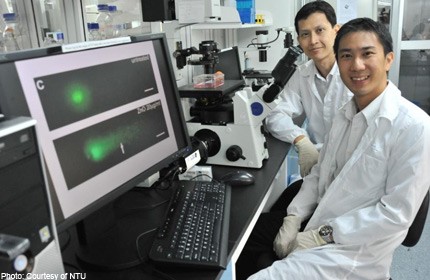Watch what you put on your skin

SINGAPORE - The next time you buy a product that touts itself as using extremely tiny chemical particles, you might want to find out more about its ingredients.
Researchers at the Nanyang Technological University (NTU) have found that products which contain nano-particles of a chemical called zinc oxide could potentially cause cancer.
Zinc oxide is used as a protective sunscreen in products because of its ability to absorb harmful ultraviolet light.
The researchers said that the possibly harmful effects of zinc oxide at such tiny sizes are compounded when a person's cells lack a protein to prevent damaged cells from multiplying and causing cancer.
The researchers are calling for regulation of nano-particles, which they say is currently lacking in the industry.
The year-long study was conducted by assistant professors Joachim Loo and Ng Kee Woei, both from NTU's School of Materials Science and Engineering, together with Assistant Professor David Leong from the Department of Chemical Biomolecular Engineering at the National University of Singapore.
The findings, which were shared yesterday, have been published in this month's issue of the Biomaterials journal.
Dr Loo said there is no cause for alarm yet, as it was a preliminary study done on human cells in a laboratory. The next step would be to translate the results to more cells and conduct animal trials, he said.
"We are not trying to link cosmetics and sunscreen with cancer," he said, adding that much more research is needed before any definite link can be drawn. Eventually, they hope to design safer nano-materials that can be used in consumer products, and work with the Health Sciences Authority (HSA) to define a safe scope of use.
The United States Food and Drug Administration currently does not regulate the production, handling or labelling of nano-products.
When contacted, HSA said zinc oxide is currently allowed as an ingredient for cosmetic products under the Asean Cosmetic Directive. The authority "has not received any adverse reports related to the use of cosmetic products containing nano- particle ingredients locally".
HSA is monitoring the situation and "will take into consideration the relevant scientific developments in this area".
Mr Alain Khaiat, president of the Cosmetic, Toiletry and Fragrance Association of Singapore, said the results might cause "unnecessary worries" among consumers.
Cosmetics are complex formulations, not simple chemicals put directly in contact with cells, he said.
"Sunscreen formulations are carefully designed not to penetrate the skin, and the skin barrier prevents the penetration, if any."

For more my paper stories click here.